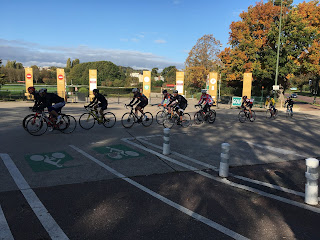I visited Belleau Wood in northeastern France, site of a battle unlike most of the terrible trench warfare of World War I. In Belleau Wood, newly arrived American Soldiers and Marines reinforced the allied armies against a new German attack. Hundreds of thousands of German soldiers were transferred to the west as Russia left the war to fall into revolution.
At Belleau Wood the Americans first stopped the German assault then counterattacked, never stopping to dig trenches or retreat from the attacking army. At one point, a French commander told the Americans to fall back and dig trenches. A Marine captain said, "Retreat? Hell no. We just got here."
The story of the battle is available form many sources. I visited to see how the world heals itself from the horror of war. Belleau Wood is beautiful. The rolling wheat fields that surround it where so many Marines died in a direct assault in June of 1918 were fallow, long past harvest at the end of October a century later. The wood itself, splintered by millions of bullets and tens of thousands of rounds of artillery, are peaceful, carpeted with leaves and showing no signs of rage and death.
The cannons that ring the monument to the Marines in a clearing in the wood are black, somber and as peaceful as the woods around them. On this trip I will visit battle sites and Holocaust sites to see how life goes on after slaughter. Belleau Wood and the rolling farm country around it could hardly be more different than the temporary terror of 1918. Moments of heroism and long years of peace are both part of the human condition: both very real and a very real paradox that both exist in the same place--though not at the same time.















